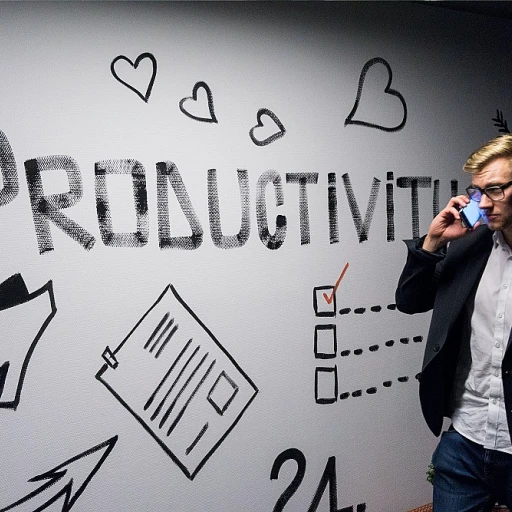
The Rise of Remote Work
Transforming the Workplace with Remote Opportunities
The rise of remote work has dramatically transformed the landscape of the traditional workplace. This shift is driven by technological advancements and the increasing demand for flexibility from today's workforce. Businesses are no longer confined to hiring talent within their geographical location, opening the doors to a global pool of experts and skilled professionals. As more companies adopt remote work, they are learning to leverage collaboration tools, empowering teams to stay connected and productive. Remote work also calls for a change in strategy when it comes to leadership. Leaders today must be agile, adapting their techniques to manage virtual teams effectively. This requires a higher level of emotional intelligence and new ways to foster a sense of connection and inclusion. The availability of remote work is not just a change in logistics; it's a shift in culture that requires leaders to be dynamic and foresightful in their approach. For many employees, remote work is more than just a trend—it is a pathway to achieving a better work-life balance, something that is crucial in the fast-paced digital age. By offering the flexibility to work from anywhere, companies not only enhance employee satisfaction but also improve productivity by allowing individuals to work in environments where they feel most comfortable. Businesses, therefore, need to develop future-ready strategies that embrace the continuing evolution of remote work. Emphasizing diversity and inclusion is pivotal as it ensures that all voices are heard, regardless of location. This understanding helps to shape a unified workplace culture that is conducive to innovation and shared success. Keynote speakers and authors on the future of work highlight the critical need for leaders to be proactive in adapting to these changes. Insights from leadership experts emphasize preparing for an unpredictable future by fostering a flexible mindset and being open to constant learning and adaptation. To explore more perspectives on remote work and its impact on the future, consider exploring insights from events such as the Collision Conference in NOLA, where industry leaders and experts share their experiences and strategies.Technological Advancements and Automation
Embracing Technological Shifts
The future of work is undeniably intertwined with technological advancements and automation. As businesses evolve, the integration of technology becomes a pivotal factor in shaping workplace dynamics. Leaders are tasked with navigating this fast-paced environment, ensuring that their teams are future-ready and equipped to handle the changes that come with it.
Automation and Its Impact
Automation is not just a buzzword; it's a reality that is transforming industries across the globe. From manufacturing to service sectors, the implementation of automated systems is streamlining processes and increasing efficiency. However, this shift also raises questions about job availability and the skills required for the future. As automation takes over repetitive tasks, the demand for roles that require emotional intelligence and creative problem-solving is on the rise.
Technological Tools for Leaders
For leaders, understanding and leveraging these technological tools is crucial. Leadership experts emphasize the importance of staying informed about the latest advancements and integrating them into business strategies. This not only enhances productivity but also fosters a culture of innovation within the workplace. Keynote speakers often highlight the need for leaders to be adaptable and open to learning, as these qualities are essential in creating a future-ready workforce.
Preparing for a Connected Future
As we look towards a connected future, it's essential to consider how these technological changes will impact work-life balance and diversity in the workplace. The availability of remote work options, for instance, is reshaping how people perceive traditional work environments. Leaders must be proactive in addressing these shifts, ensuring that their teams are supported and equipped to thrive in this new landscape.
For more insights on how technology is shaping the future of work, you can explore the future of work in a connected America.
Skills for the Future
Elevating Skills to Thrive in Tomorrow's Workplace
The landscape of work is rapidly evolving, making it essential for individuals and organizations to align with the shifts. Remaining relevant in this fast-paced environment requires a strategic focus on developing the right skills, beyond mere technical abilities. The future of work demands a blend of human-centric competencies combined with the adept use of technology. One key area that demands attention is emotional intelligence, which plays a significant role in enhancing collaboration and fostering a healthy workplace culture. As more teams transition to remote work setups, leaders need to be adept at managing relationships and maintaining team cohesion, even across digital platforms. This form of change leadership ensures that businesses remain resilient and future-ready. In addition to emotional intelligence, adaptability is a crucial skill for navigating uncertainty. The ability to learn and apply new strategies swiftly allows individuals and organizations to keep pace with the dynamic demands of the industry. For example, engaging with leadership experts and participating in high energy keynote events can serve as a platform for acquiring new insights and skills. The availability of resources such as keynote speakers and books on contemporary leadership strategies provides further opportunities for growth. By seeking knowledge from reputable speakers and authors, individuals can gain diverse perspectives on managing change and leveraging leadership to create a sustainable business model. Furthermore, fostering a culture of continuous learning within teams encourages innovation and adaptability. Employers can support this by offering training programs and creating opportunities for employees to request development initiatives tailored to their career aspirations. For those interested in a comprehensive understanding of legislative impacts on employment, exploring the Illinois Freedom to Work Act offers valuable insights into how policies shape the landscape of future work. As we move forward, the role of leadership in guiding teams through these transitions becomes increasingly critical. Ultimately, cultivating a versatile skill set paves the way for successful navigation in the ever-changing workplace. As expectations shift, embracing these strategies will not only enhance individual capabilities but also strengthen the overall business framework. Embracing the nuances of leadership today prepares us to better create the future of work.Work-Life Balance in the Digital Age
Creating a Harmonious Work-Life Equation
The digital age has certainly reshaped the way we work, presenting both opportunities and challenges. As remote work becomes a staple, it poses an essential question: how do we maintain a healthy work-life balance? For many people, the availability of constant connectivity blurs the lines between work responsibilities and personal life, making it crucial for leaders, especially in fast-paced industries, to devise strategies that support a balanced lifestyle. Achieving equilibrium is more than just reducing work hours; it's about fostering an organizational culture that acknowledges the importance of personal time. Leaders and managers must prioritize emotional intelligence, empowering individuals to speak openly about their needs and boundaries. As noted in earlier sections, the rise of remote work and technological advancements require leaders to possess the flexibility to accommodate diverse work styles. Moreover, in the pursuit of creating a future-ready workplace, businesses that encourage work-life balance find themselves better positioned to attract and retain top talent. Professionals today are not only searching for roles that offer them growth but also ones that respect their personal lives. Organizations that succeed in doing so are likely to see enhanced employee satisfaction and productivity. Keynote speakers and leadership experts often emphasize the importance of high energy and passionate engagement among leaders and their teams. By embracing a culture of mutual respect and support, businesses can not only inspire their employees but also drive performance and innovation in the future work landscape. It's crucial for leaders to learn from change leadership experts and adapt their approaches to suit the evolving needs of the workplace. Speaker authors and keynote speakers continuously advocate for such practices in their discussions, making them essential topics for anyone aiming to create future-ready organizations. Leveraging these insights can play a vital role in promoting a balanced work-life dynamic in the digital era.Diversity and Inclusion in the Workplace
Fostering an Inclusive Culture
As the future of work evolves, diversity and inclusion are becoming more than just buzzwords; they are essential components of a thriving workplace. Organizations are recognizing that a diverse workforce brings a wealth of perspectives, driving innovation and creativity. In a fast-paced business environment, leaders must prioritize creating a culture where everyone feels valued and heard.
Strategies for Inclusive Leadership
Inclusive leadership requires more than just policies; it demands a shift in mindset and strategies. Leaders need to develop emotional intelligence to understand and address the unique needs of their teams. This involves active listening and creating opportunities for all voices to be heard. Leadership experts emphasize the importance of continuous learning and adapting to change, ensuring that leaders are future-ready.
Leveraging Technology for Inclusion
Technological advancements are playing a crucial role in promoting diversity and inclusion. Remote work, as discussed earlier, has opened doors for a more diverse talent pool, allowing businesses to tap into global expertise. Tools and platforms that facilitate collaboration and communication are essential in bridging geographical and cultural gaps, fostering a more inclusive work environment.
The Role of Keynote Speakers and Authors
Keynote speakers and authors are influential in shaping the conversation around diversity and inclusion. Their insights and strategies can inspire leaders to implement meaningful changes in their organizations. Books including those by renowned authors provide valuable resources for leaders seeking to enhance their understanding of inclusive practices. Engaging with these materials can help leaders create a future-ready workplace that embraces diversity.
Commitment to Continuous Improvement
Creating an inclusive workplace is an ongoing journey that requires commitment from all levels of an organization. Leaders must be proactive in seeking feedback and making necessary adjustments to their strategies. By fostering a culture of continuous improvement, businesses can ensure they remain competitive and relevant in the future of work.













